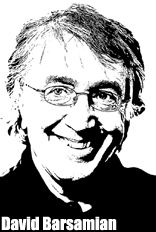on july 1st amy goodman interviewed journalist and author david barsamian about the situation in pakistan. barsamian’s comments were simple, spot on, lucid. much is made of pakistan in western media but most of the analysis is either theoretical/ivory-tower or just plain cuckoo. this was the first time i heard something that made sense to me. here are some excerpts from the interview:
1) on pakistan’s relationship with the united states. i have always felt a particular kind of kinship to latin america. now i know why – barsamian’s analysis is brilliant:
“It was the classic Latin American model, now applied to South Asia. Historically, the U.S. has always aligned itself with the military in Latin America, Central America, and the Caribbean, and now this was being expanded globally, and specifically, to Pakistan. What this has meant to Pakistan as a country is that the military has been highly privileged—it has been foreground because of U.S. attention and intention. It has been lavishly supplied with money and with arms, and at the same time this has created real fissures in civil society, which has not developed along so-called normal lines, whatever that might be.”
2) on how the disproportionate building up of pakistan’s army has affected pakistani society:
“It’s quite astonishing to learn and to know that the penetration of the Pakistani army as an economic institution into all facets of life in that country is truly breathtaking, from banks, from strip malls, from housing estates. There are 22 feudal families that have a great deal of land in the country and I make this quip, quoting the great American philosopher Yogi Berra, that if you want to understand Pakistan, 50% of the country is controlled by these 22 feudal families, and the other 90% is controlled by the military.
Billions of dollars have gone into Pakistan, but the Pakistani people have not seen any of that money. It has all gone into the military sector. And so, again, this has created enormous imbalances inside the country and a huge amount of resentment toward the United States.”
3) on what we are now fighting in afghanistan and increasingly in pakistan, and how it all came about:
“The Taliban students were actually created by the Pakistani ISI, the Inter-Services Intelligence agency, probably the most powerful and secretive organization operating inside of Pakistan. This is all an outgrowth, incidentally–again the context and background, which is so sorely missing in most reporting–of the great jihad of the 1980s, when the U.S. brought militants from all over the Islamic world. I remember one Pakistani telling me once that he saw planeloads and planeloads of these jihadis being brought in from Yemen, from Egypt, from Saudi Arabia, from Algeria, to fight against the Soviet Union. Actions have consequences. Many of the Taliban today, and Al-Qaeda as well, are not just the actual members from that period, but their sons and grandsons are now fighting.”
4) on how pakistan’s baluchistan province is being used by the u.s. to launch terrorist activities in iran – a revelation to me but apparently a story pakistani newspapers have covered for a long time:
“Pakistan has a long border with Iran in Baluchistan. When I was in Iran last year, formations across the border from Pakistan blew up a bus, killing more than 20 Iranians. There has been in Pakistani Baluchistan a longstanding resistance to control in Islamabad. There has been an independence movement there. Many have reported, and I think with credibility, that the U.S. has been funding groups inside of Baluchistan to cross over into Iran, to create incidents and destabilize the regime in Tehran. Pakistanis have a very close affinity with Iran, and any U.S. military action on Iran, I think, will again produce an enormous amount of resentment and already fuel what is called anti-American hatred. It is a little more subtle and complicated than that.”
5) on benazir bhutto and what her prime ministership would have meant:
“Benazir Bhutto was the Prime Minister of Pakistan from 1988 to 1991 and then a second term from 1993 to 1996. Both of her terms were marked by an enormous amount of corruption, particularly involving her husband, Asif Ali Zardari, who is now the titular head of the Pakistan Peoples Party. One of the internal problems in Pakistan is that the political parties have basically been family-run businesses. They have not really existed as part of a much larger organization, and this is exemplified by Benazir Bhutto, who declared herself chairperson for life. When she was assassinated on the 27th of December in 2007, in her will, she bequeathed the party to her son. Until her son matures–he is now 20 years old–the party will be run by Asif Ali Zardari. So Pakistan has had a deeply problematic political system, again, from its very origins. The military has had primacy within the political system. It has been very influential.
One of the things that Benazir Bhutto agreed to in a deal brokered by the Americans for her to return to Pakistan—you will recall she was in exile for eight or nine years—one of the components of that was Benazir Bhutto was going to allow U.S. troops to openly operate inside of Pakistan. They had been doing so clandestinely for a number of years, particularly in the contested so-called tribal areas along the Afghan-Pakistan frontier. Now the war is coming closer to Peshawar, which is a city of 3 million. It’s the capital of the northwest frontier province. There’s a garrison of some 50,000-60,000 Pakistani troops there. But the Pakistani military, large segments of it, have no stomach for this fight. They are highly demoralized.”
you can listen to the entire interview at democracynow.org
also check out barsamian’s alternative radio website.

